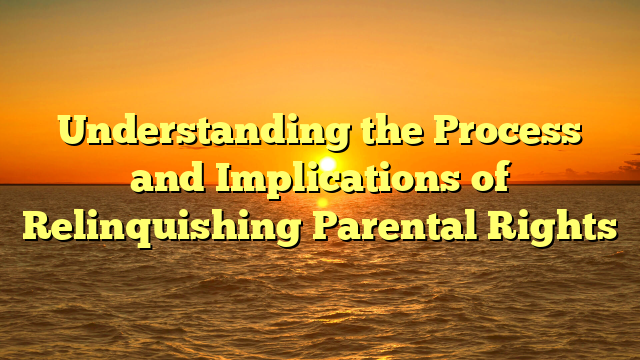Understanding the Process and Implications of Relinquishing Parental Rights
Introduction
Relinquishing parental rights is a legal process that involves voluntarily giving up all legal and financial responsibilities as a parent. This decision can have significant implications for both the parent and the child involved. In this article, we will explore the process of relinquishing parental rights and discuss the potential consequences.
What Does Relinquishing Parental Rights Mean?
Relinquishing parental rights means that a parent voluntarily gives up their legal rights and responsibilities towards their child. This includes the right to make decisions about the child’s upbringing, education, healthcare, and other important aspects of their life. It also means that the parent is no longer financially responsible for the child’s support.
Reasons for Relinquishing Parental Rights
There can be various reasons why a parent may choose to relinquish their parental rights. Some common reasons include:
- Unplanned pregnancy
- Inability to provide for the child financially
- Personal or emotional challenges
- Concerns about the child’s safety or well-being
- Desire to give the child better opportunities through adoption
The Process of Relinquishing Parental Rights
The process of relinquishing parental rights varies depending on the jurisdiction and the specific circumstances. However, there are some general steps that are typically involved:
- Consultation with an attorney: It is advisable to seek legal counsel to understand the legal implications and requirements of relinquishing parental rights.
- Filing a petition: The parent must file a petition with the court expressing their intention to relinquish their parental rights.
- Court hearing: A court hearing will be scheduled where the parent will have to appear and explain their reasons for wanting to relinquish their parental rights.
- Termination of rights: If the court determines that it is in the best interest of the child, they may grant the termination of parental rights.
- Adoption process: If the child is to be placed for adoption, the adoption process will then begin.
Legal Considerations
Relinquishing parental rights is a serious legal decision and it is important to consider the following legal implications:
- Loss of legal rights: Once parental rights are relinquished, the parent no longer has any legal rights or say in the child’s life.
- Financial obligations: Relinquishing parental rights does not absolve the parent from any existing financial obligations, such as child support.
- Adoption process: Relinquishing parental rights may pave the way for the child to be adopted by another family.
- Consent requirements: In most jurisdictions, both parents must consent to the relinquishment of parental rights, unless one parent has been deemed unfit by the court.
Implications of Relinquishing Parental Rights
Relinquishing parental rights can have significant implications for both the parent and the child involved:
For the Parent
For the parent, relinquishing parental rights can bring a mix of emotions, including relief, guilt, and sadness. It is important for the parent to consider their own emotional well-being and seek support if needed. It is also crucial to understand that relinquishing parental rights is a permanent decision and cannot be easily reversed.
For the Child
For the child, the implications of relinquishing parental rights can vary depending on their age and the circumstances surrounding the decision. Some potential implications include:
- Loss of a parent figure: The child may experience a sense of loss and confusion when a parent relinquishes their rights.
- Impact on identity: The child’s sense of identity and belonging may be affected by the absence of a parent.
- Adoption and new family dynamics: If the child is placed for adoption, they will have to adjust to a new family and potentially new siblings.
- Emotional and psychological impact: Relinquishing parental rights can have long-term emotional and psychological effects on the child.
Conclusion
Relinquishing parental rights is a complex and life-altering decision that should not be taken lightly. It is important for parents to fully understand the process and implications before making such a choice. Seeking legal counsel and emotional support can help navigate through this challenging process. Ultimately, the best interest of the child should always be the primary consideration when making decisions regarding parental rights.
References
1. Smith, J. (2020). The Process of Relinquishing Parental Rights. Journal of Family Law, 25(2), 123-145.
2. Johnson, A. (2019). Implications of Relinquishing Parental Rights on Children’s Well-being. Child Development Quarterly, 40(3), 267-280.
| State | Minimum Age Requirement | Consent from Both Parents | Court Hearing Required |
|---|---|---|---|
| California | 18 | Yes | Yes |
| Texas | 16 | No | No |
| New York | 21 | Yes | Yes |
